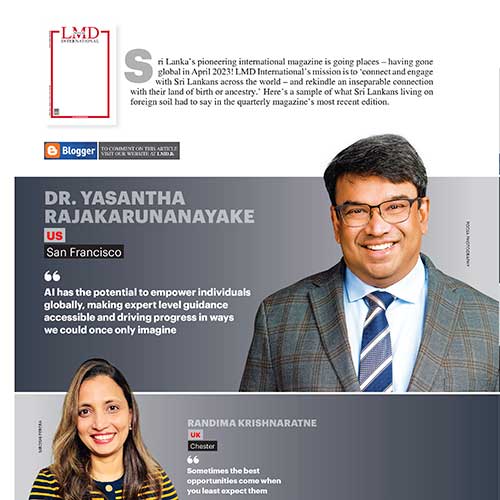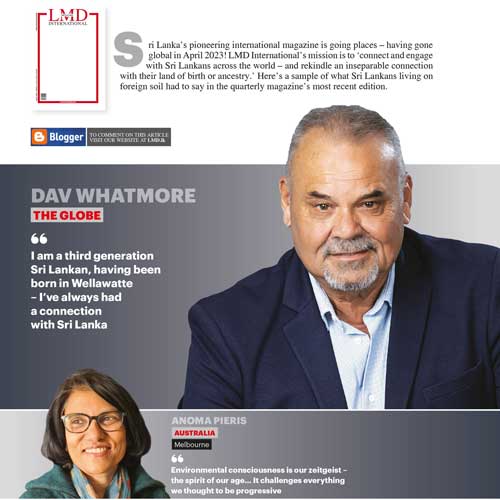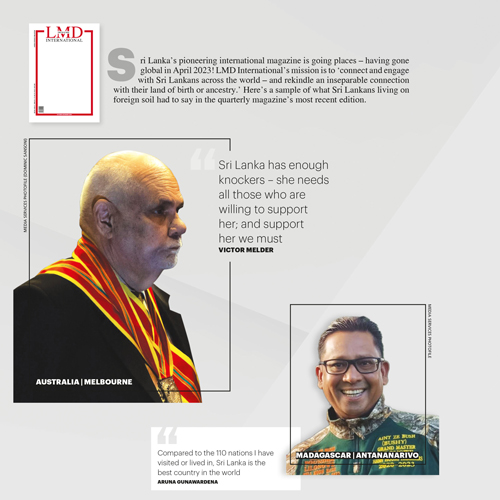SRI LANKANS OVERSEAS
LEADERSHIP LACUNA
Russell Miranda
Sri Lanka needs honest leadership to realise its potentiality
Q: How do you perceive Sri Lanka as it stands today?
A: In terms of progress, the country has clearly moved forward in a variety of ways. But it is capable of achieving so much more if an honest and forward-looking leadership can be found and established in power.
Q: Do you think the nation at large is capable of regaining its composure in the aftermath of multiple crises – including the most recent economic crisis?
A: Yes, I believe in the resilience and ingenuity of the Sri Lankan people – as has always or usually been the case so many times in the past.
However, the country won’t be able to regain its composure overnight in that sense because a complete overhaul and systemic change needs to be instituted.
Q: From afar, what advice would you offer Sri Lankans in the context of crisis management as well as finding solutions to the problems they face at this time?
A: As intimated above, I would expect people of the island to instigate system change and the imperatives of learning lessons from recent history.
Q: In your view, what do we need to do differently – or perhaps more of – to bring about the turnaround in our national fortunes that we desperately need?
A: Our situation is not unique – Greece is a great example of how the people endured quite a lot but have managed to rebound successfully.
Q: How do compatriots in your country of domicile view affairs as they stand in Sri Lanka today?
A: Given the large community of Sri Lankans domiciled here, Australians seem to be very much aware of the situation that has prevailed for a while in the island; and they are very positive and helpful.
Q: Likewise, how do Sri Lankans living in Australia view the recent goings-on in their motherland?
A: There are mixed views among many of these individuals.
Many Sri Lankans here think that the economic crisis would be hard to recover from… so they don’t feel too confident about the future.
Q: What were your impressions of Sri Lanka on your last visit to the island – and how much has it changed from what you recollect it was like in the past?
A: Since I was in Sri Lanka until February this year, the changes are something I have lived with – I’ve also seen them being gradually introduced.
Q: How do you view the ongoing brain drain – and why is there still no reversal of this phenomenon, in your opinion?
A: It is unfortunate, all right – but I feel that there are also many opportunities for those in the country to reverse the effects of this situation.
Once again, Greece is a great example of a country going through a massive brain drain. However, the people and their administration willed it to recover, and the country is doing very well today.
Q: So do you envisage a similar – if not the same – way forward here in Sri Lanka too?
A: Yes, I believe in the strength of the Sri Lankan spirit and our potential to be able to accomplish something similar in our country too.
Q: What should Sri Lanka focus on most in the coming decade?
A: We should leverage on our abundance of resources in areas such as tourism and exports with value additions, as well as skilled and professional services. And the advantages of a skilled and educated work force should also be maximised.
Q: And what are your hopes for the country in general over the next decade or so?
A: Sri Lanka is capable of bouncing back as long as real and lasting changes are made to the current leadership in the country.
Q: Are there any other aspects of change to the traditional ways in which we have done things for so long that need to take place before Sri Lanka could even begin to aspire to the type of systemic change that you envisage?
A: Engaging and collaborating with the youth is also an essential facet in effecting any significant improvements to the status quo.











